The Importance of Self-Leadership in Social Work Profession
VerifiedAdded on 2023/06/04
|7
|1906
|130
Essay
AI Summary
This essay explores the concept of self-leadership in the social work profession, emphasizing its importance for effective practice. It defines self-leadership as having a strong sense of self-awareness, capabilities, and direction, coupled with the ability to influence one's behavior and emotions. The essay outlines the steps for developing self-leadership, including self-discovery, incorporating feedback, and seeking mentorship. It also discusses ways to improve self-leadership by avoiding negative influences and embracing calculated risks. The essay highlights the benefits of self-leadership for social workers, such as improved decision-making, enhanced potential, reduced supervision, increased discipline, and proactive behavior, ultimately leading to better client outcomes. It concludes that self-leadership is essential for social workers who aspire to deliver high-quality services and navigate the complexities of their profession effectively, supported by resources and past papers available on Desklib.

Running head: LEADERSHIP FOR THE PROFESSION 1
Leadership for the profession
Name
Institution
Leadership for the profession
Name
Institution
Paraphrase This Document
Need a fresh take? Get an instant paraphrase of this document with our AI Paraphraser
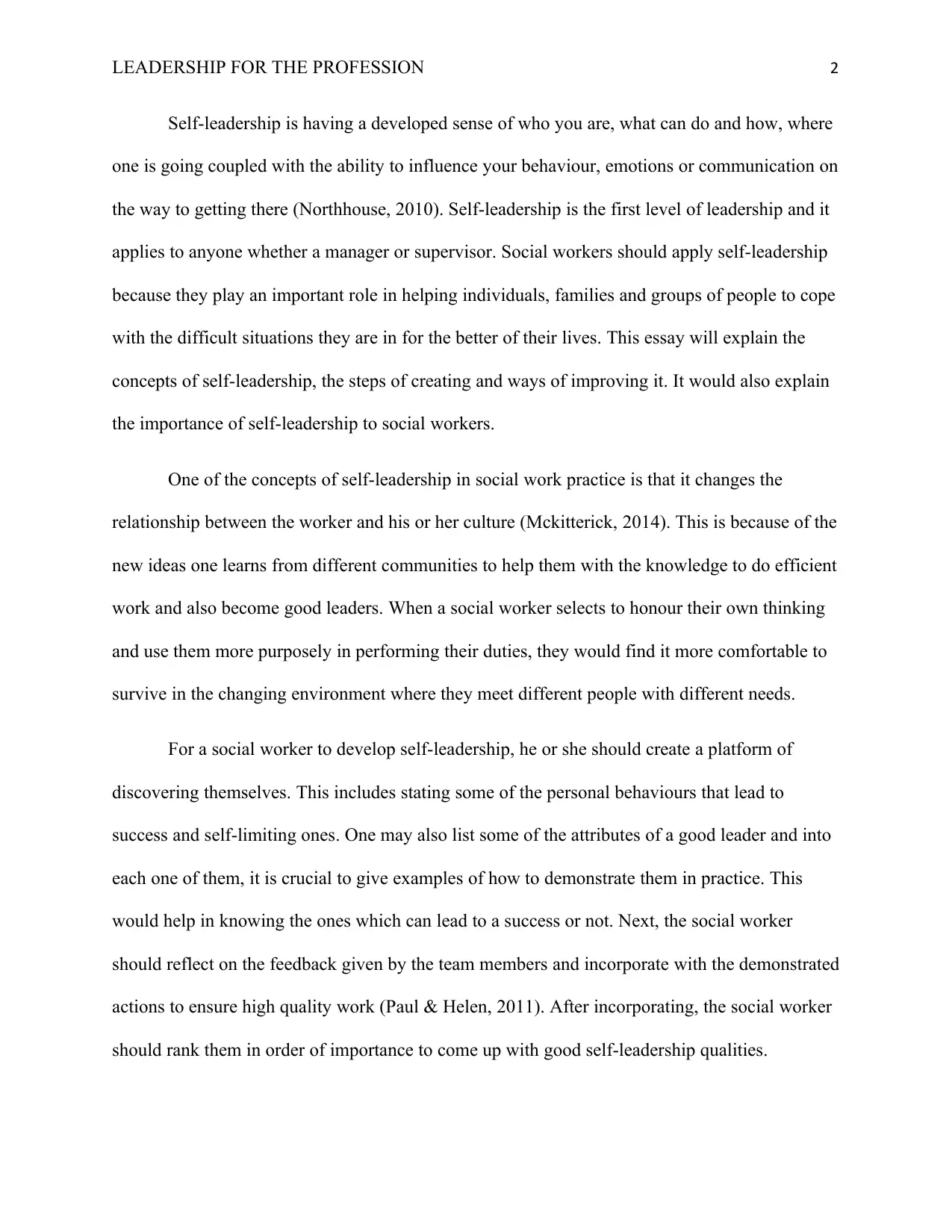
LEADERSHIP FOR THE PROFESSION 2
Self-leadership is having a developed sense of who you are, what can do and how, where
one is going coupled with the ability to influence your behaviour, emotions or communication on
the way to getting there (Northhouse, 2010). Self-leadership is the first level of leadership and it
applies to anyone whether a manager or supervisor. Social workers should apply self-leadership
because they play an important role in helping individuals, families and groups of people to cope
with the difficult situations they are in for the better of their lives. This essay will explain the
concepts of self-leadership, the steps of creating and ways of improving it. It would also explain
the importance of self-leadership to social workers.
One of the concepts of self-leadership in social work practice is that it changes the
relationship between the worker and his or her culture (Mckitterick, 2014). This is because of the
new ideas one learns from different communities to help them with the knowledge to do efficient
work and also become good leaders. When a social worker selects to honour their own thinking
and use them more purposely in performing their duties, they would find it more comfortable to
survive in the changing environment where they meet different people with different needs.
For a social worker to develop self-leadership, he or she should create a platform of
discovering themselves. This includes stating some of the personal behaviours that lead to
success and self-limiting ones. One may also list some of the attributes of a good leader and into
each one of them, it is crucial to give examples of how to demonstrate them in practice. This
would help in knowing the ones which can lead to a success or not. Next, the social worker
should reflect on the feedback given by the team members and incorporate with the demonstrated
actions to ensure high quality work (Paul & Helen, 2011). After incorporating, the social worker
should rank them in order of importance to come up with good self-leadership qualities.
Self-leadership is having a developed sense of who you are, what can do and how, where
one is going coupled with the ability to influence your behaviour, emotions or communication on
the way to getting there (Northhouse, 2010). Self-leadership is the first level of leadership and it
applies to anyone whether a manager or supervisor. Social workers should apply self-leadership
because they play an important role in helping individuals, families and groups of people to cope
with the difficult situations they are in for the better of their lives. This essay will explain the
concepts of self-leadership, the steps of creating and ways of improving it. It would also explain
the importance of self-leadership to social workers.
One of the concepts of self-leadership in social work practice is that it changes the
relationship between the worker and his or her culture (Mckitterick, 2014). This is because of the
new ideas one learns from different communities to help them with the knowledge to do efficient
work and also become good leaders. When a social worker selects to honour their own thinking
and use them more purposely in performing their duties, they would find it more comfortable to
survive in the changing environment where they meet different people with different needs.
For a social worker to develop self-leadership, he or she should create a platform of
discovering themselves. This includes stating some of the personal behaviours that lead to
success and self-limiting ones. One may also list some of the attributes of a good leader and into
each one of them, it is crucial to give examples of how to demonstrate them in practice. This
would help in knowing the ones which can lead to a success or not. Next, the social worker
should reflect on the feedback given by the team members and incorporate with the demonstrated
actions to ensure high quality work (Paul & Helen, 2011). After incorporating, the social worker
should rank them in order of importance to come up with good self-leadership qualities.
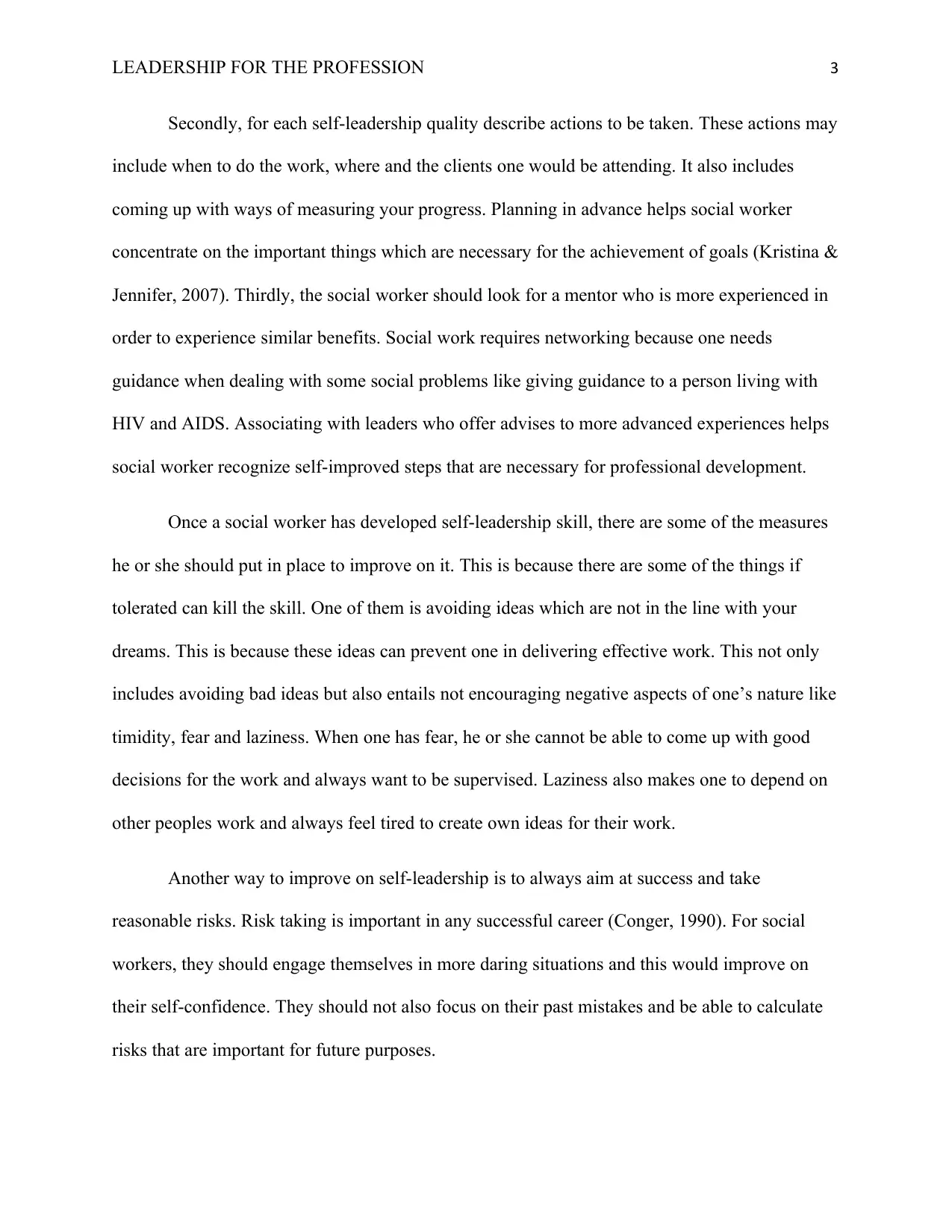
LEADERSHIP FOR THE PROFESSION 3
Secondly, for each self-leadership quality describe actions to be taken. These actions may
include when to do the work, where and the clients one would be attending. It also includes
coming up with ways of measuring your progress. Planning in advance helps social worker
concentrate on the important things which are necessary for the achievement of goals (Kristina &
Jennifer, 2007). Thirdly, the social worker should look for a mentor who is more experienced in
order to experience similar benefits. Social work requires networking because one needs
guidance when dealing with some social problems like giving guidance to a person living with
HIV and AIDS. Associating with leaders who offer advises to more advanced experiences helps
social worker recognize self-improved steps that are necessary for professional development.
Once a social worker has developed self-leadership skill, there are some of the measures
he or she should put in place to improve on it. This is because there are some of the things if
tolerated can kill the skill. One of them is avoiding ideas which are not in the line with your
dreams. This is because these ideas can prevent one in delivering effective work. This not only
includes avoiding bad ideas but also entails not encouraging negative aspects of one’s nature like
timidity, fear and laziness. When one has fear, he or she cannot be able to come up with good
decisions for the work and always want to be supervised. Laziness also makes one to depend on
other peoples work and always feel tired to create own ideas for their work.
Another way to improve on self-leadership is to always aim at success and take
reasonable risks. Risk taking is important in any successful career (Conger, 1990). For social
workers, they should engage themselves in more daring situations and this would improve on
their self-confidence. They should not also focus on their past mistakes and be able to calculate
risks that are important for future purposes.
Secondly, for each self-leadership quality describe actions to be taken. These actions may
include when to do the work, where and the clients one would be attending. It also includes
coming up with ways of measuring your progress. Planning in advance helps social worker
concentrate on the important things which are necessary for the achievement of goals (Kristina &
Jennifer, 2007). Thirdly, the social worker should look for a mentor who is more experienced in
order to experience similar benefits. Social work requires networking because one needs
guidance when dealing with some social problems like giving guidance to a person living with
HIV and AIDS. Associating with leaders who offer advises to more advanced experiences helps
social worker recognize self-improved steps that are necessary for professional development.
Once a social worker has developed self-leadership skill, there are some of the measures
he or she should put in place to improve on it. This is because there are some of the things if
tolerated can kill the skill. One of them is avoiding ideas which are not in the line with your
dreams. This is because these ideas can prevent one in delivering effective work. This not only
includes avoiding bad ideas but also entails not encouraging negative aspects of one’s nature like
timidity, fear and laziness. When one has fear, he or she cannot be able to come up with good
decisions for the work and always want to be supervised. Laziness also makes one to depend on
other peoples work and always feel tired to create own ideas for their work.
Another way to improve on self-leadership is to always aim at success and take
reasonable risks. Risk taking is important in any successful career (Conger, 1990). For social
workers, they should engage themselves in more daring situations and this would improve on
their self-confidence. They should not also focus on their past mistakes and be able to calculate
risks that are important for future purposes.
⊘ This is a preview!⊘
Do you want full access?
Subscribe today to unlock all pages.

Trusted by 1+ million students worldwide
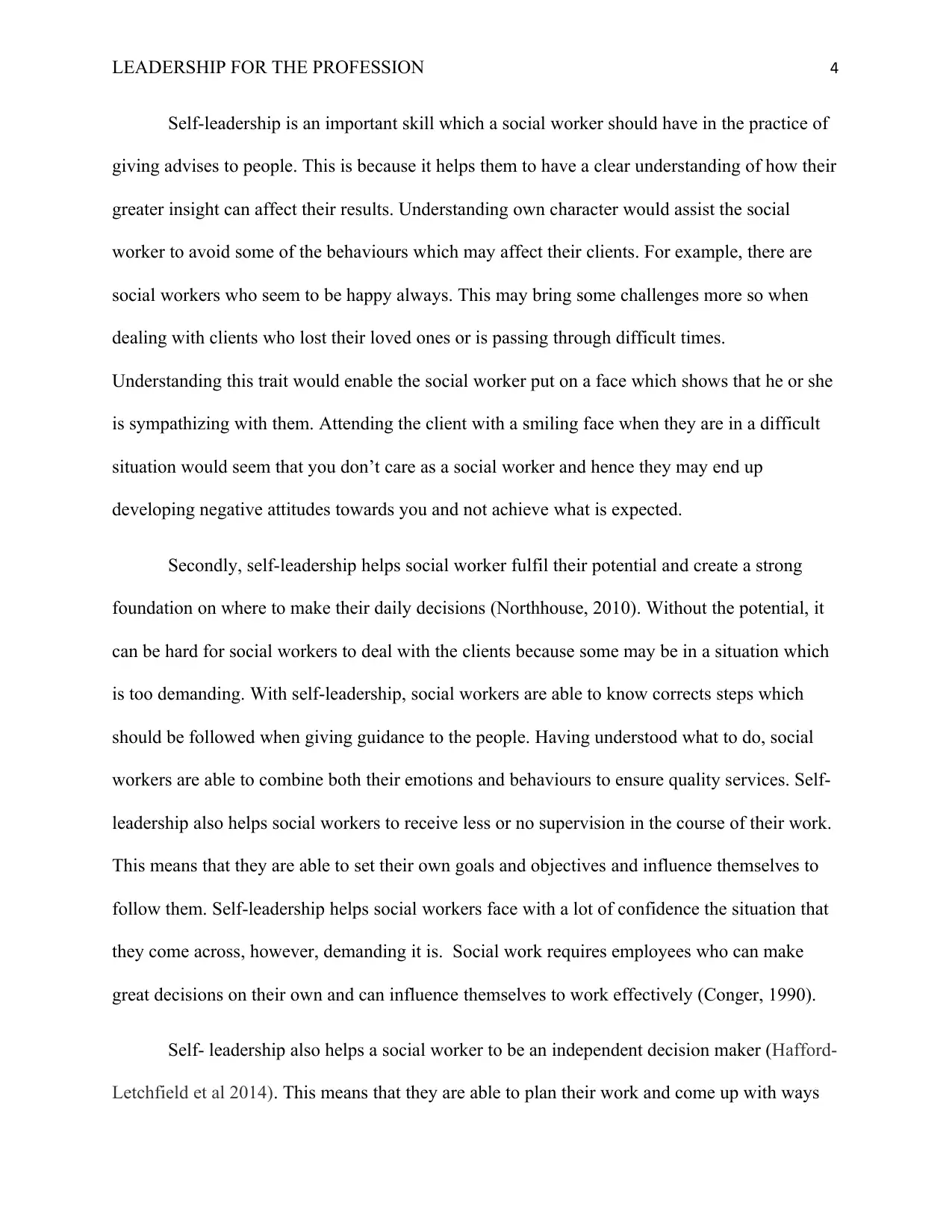
LEADERSHIP FOR THE PROFESSION 4
Self-leadership is an important skill which a social worker should have in the practice of
giving advises to people. This is because it helps them to have a clear understanding of how their
greater insight can affect their results. Understanding own character would assist the social
worker to avoid some of the behaviours which may affect their clients. For example, there are
social workers who seem to be happy always. This may bring some challenges more so when
dealing with clients who lost their loved ones or is passing through difficult times.
Understanding this trait would enable the social worker put on a face which shows that he or she
is sympathizing with them. Attending the client with a smiling face when they are in a difficult
situation would seem that you don’t care as a social worker and hence they may end up
developing negative attitudes towards you and not achieve what is expected.
Secondly, self-leadership helps social worker fulfil their potential and create a strong
foundation on where to make their daily decisions (Northhouse, 2010). Without the potential, it
can be hard for social workers to deal with the clients because some may be in a situation which
is too demanding. With self-leadership, social workers are able to know corrects steps which
should be followed when giving guidance to the people. Having understood what to do, social
workers are able to combine both their emotions and behaviours to ensure quality services. Self-
leadership also helps social workers to receive less or no supervision in the course of their work.
This means that they are able to set their own goals and objectives and influence themselves to
follow them. Self-leadership helps social workers face with a lot of confidence the situation that
they come across, however, demanding it is. Social work requires employees who can make
great decisions on their own and can influence themselves to work effectively (Conger, 1990).
Self- leadership also helps a social worker to be an independent decision maker (Hafford-
Letchfield et al 2014). This means that they are able to plan their work and come up with ways
Self-leadership is an important skill which a social worker should have in the practice of
giving advises to people. This is because it helps them to have a clear understanding of how their
greater insight can affect their results. Understanding own character would assist the social
worker to avoid some of the behaviours which may affect their clients. For example, there are
social workers who seem to be happy always. This may bring some challenges more so when
dealing with clients who lost their loved ones or is passing through difficult times.
Understanding this trait would enable the social worker put on a face which shows that he or she
is sympathizing with them. Attending the client with a smiling face when they are in a difficult
situation would seem that you don’t care as a social worker and hence they may end up
developing negative attitudes towards you and not achieve what is expected.
Secondly, self-leadership helps social worker fulfil their potential and create a strong
foundation on where to make their daily decisions (Northhouse, 2010). Without the potential, it
can be hard for social workers to deal with the clients because some may be in a situation which
is too demanding. With self-leadership, social workers are able to know corrects steps which
should be followed when giving guidance to the people. Having understood what to do, social
workers are able to combine both their emotions and behaviours to ensure quality services. Self-
leadership also helps social workers to receive less or no supervision in the course of their work.
This means that they are able to set their own goals and objectives and influence themselves to
follow them. Self-leadership helps social workers face with a lot of confidence the situation that
they come across, however, demanding it is. Social work requires employees who can make
great decisions on their own and can influence themselves to work effectively (Conger, 1990).
Self- leadership also helps a social worker to be an independent decision maker (Hafford-
Letchfield et al 2014). This means that they are able to plan their work and come up with ways
Paraphrase This Document
Need a fresh take? Get an instant paraphrase of this document with our AI Paraphraser
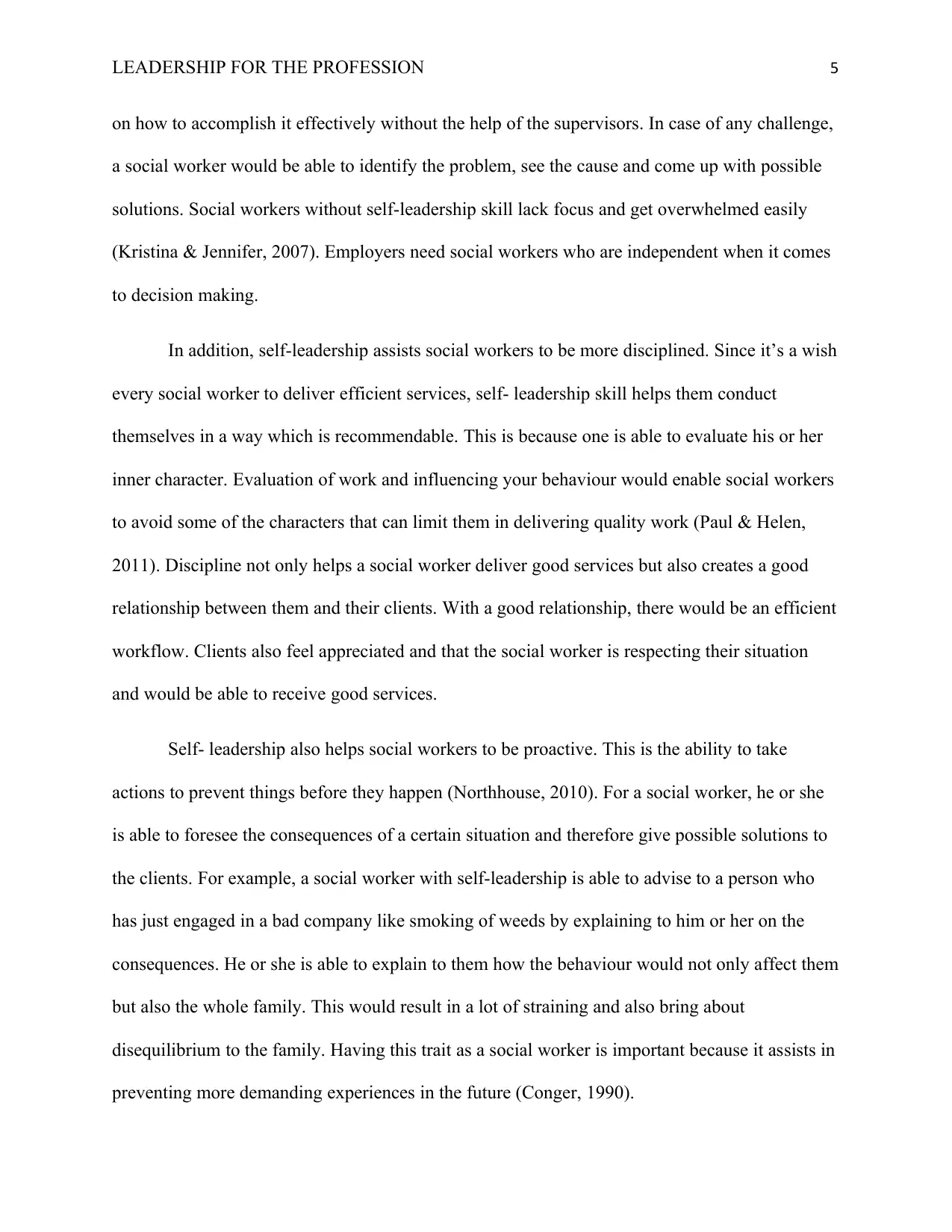
LEADERSHIP FOR THE PROFESSION 5
on how to accomplish it effectively without the help of the supervisors. In case of any challenge,
a social worker would be able to identify the problem, see the cause and come up with possible
solutions. Social workers without self-leadership skill lack focus and get overwhelmed easily
(Kristina & Jennifer, 2007). Employers need social workers who are independent when it comes
to decision making.
In addition, self-leadership assists social workers to be more disciplined. Since it’s a wish
every social worker to deliver efficient services, self- leadership skill helps them conduct
themselves in a way which is recommendable. This is because one is able to evaluate his or her
inner character. Evaluation of work and influencing your behaviour would enable social workers
to avoid some of the characters that can limit them in delivering quality work (Paul & Helen,
2011). Discipline not only helps a social worker deliver good services but also creates a good
relationship between them and their clients. With a good relationship, there would be an efficient
workflow. Clients also feel appreciated and that the social worker is respecting their situation
and would be able to receive good services.
Self- leadership also helps social workers to be proactive. This is the ability to take
actions to prevent things before they happen (Northhouse, 2010). For a social worker, he or she
is able to foresee the consequences of a certain situation and therefore give possible solutions to
the clients. For example, a social worker with self-leadership is able to advise to a person who
has just engaged in a bad company like smoking of weeds by explaining to him or her on the
consequences. He or she is able to explain to them how the behaviour would not only affect them
but also the whole family. This would result in a lot of straining and also bring about
disequilibrium to the family. Having this trait as a social worker is important because it assists in
preventing more demanding experiences in the future (Conger, 1990).
on how to accomplish it effectively without the help of the supervisors. In case of any challenge,
a social worker would be able to identify the problem, see the cause and come up with possible
solutions. Social workers without self-leadership skill lack focus and get overwhelmed easily
(Kristina & Jennifer, 2007). Employers need social workers who are independent when it comes
to decision making.
In addition, self-leadership assists social workers to be more disciplined. Since it’s a wish
every social worker to deliver efficient services, self- leadership skill helps them conduct
themselves in a way which is recommendable. This is because one is able to evaluate his or her
inner character. Evaluation of work and influencing your behaviour would enable social workers
to avoid some of the characters that can limit them in delivering quality work (Paul & Helen,
2011). Discipline not only helps a social worker deliver good services but also creates a good
relationship between them and their clients. With a good relationship, there would be an efficient
workflow. Clients also feel appreciated and that the social worker is respecting their situation
and would be able to receive good services.
Self- leadership also helps social workers to be proactive. This is the ability to take
actions to prevent things before they happen (Northhouse, 2010). For a social worker, he or she
is able to foresee the consequences of a certain situation and therefore give possible solutions to
the clients. For example, a social worker with self-leadership is able to advise to a person who
has just engaged in a bad company like smoking of weeds by explaining to him or her on the
consequences. He or she is able to explain to them how the behaviour would not only affect them
but also the whole family. This would result in a lot of straining and also bring about
disequilibrium to the family. Having this trait as a social worker is important because it assists in
preventing more demanding experiences in the future (Conger, 1990).
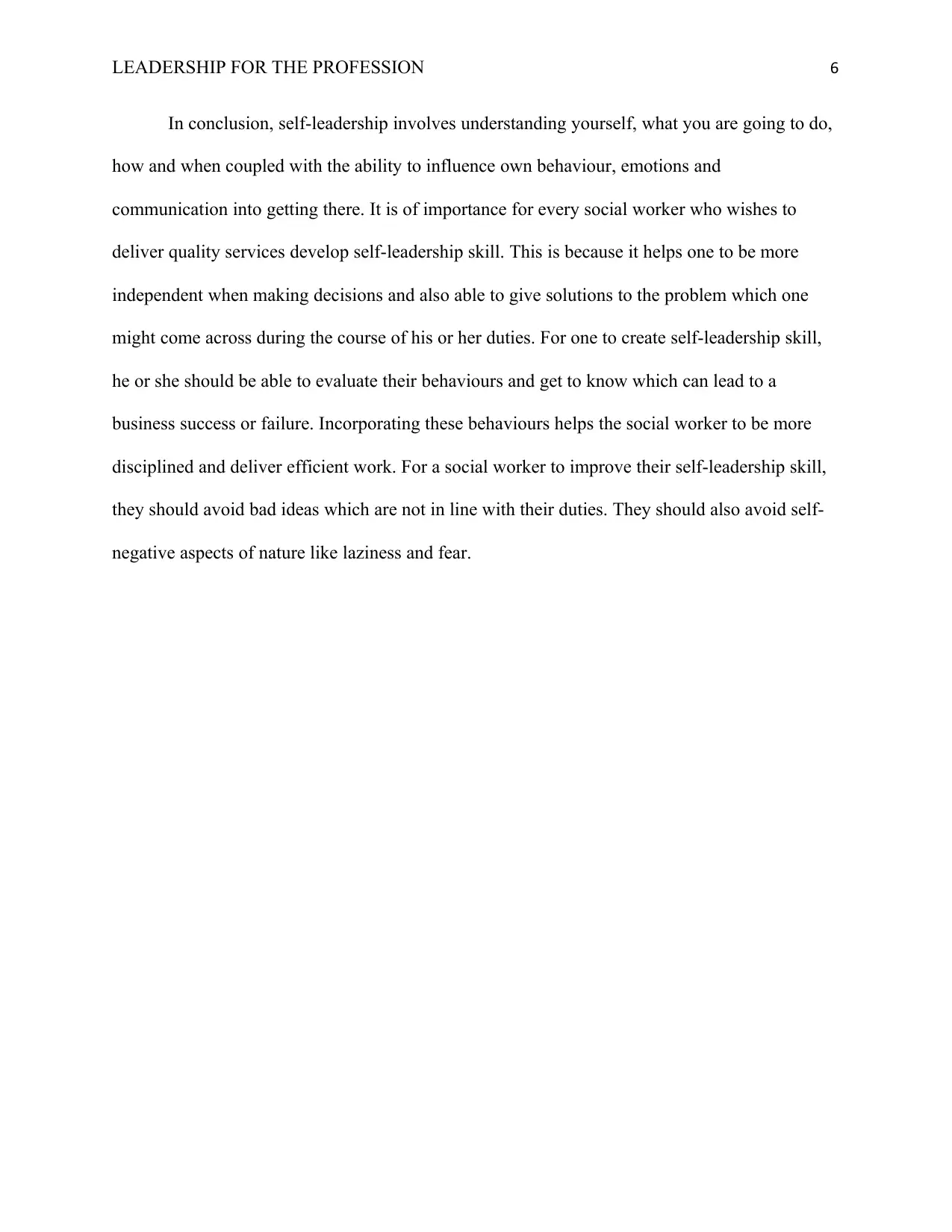
LEADERSHIP FOR THE PROFESSION 6
In conclusion, self-leadership involves understanding yourself, what you are going to do,
how and when coupled with the ability to influence own behaviour, emotions and
communication into getting there. It is of importance for every social worker who wishes to
deliver quality services develop self-leadership skill. This is because it helps one to be more
independent when making decisions and also able to give solutions to the problem which one
might come across during the course of his or her duties. For one to create self-leadership skill,
he or she should be able to evaluate their behaviours and get to know which can lead to a
business success or failure. Incorporating these behaviours helps the social worker to be more
disciplined and deliver efficient work. For a social worker to improve their self-leadership skill,
they should avoid bad ideas which are not in line with their duties. They should also avoid self-
negative aspects of nature like laziness and fear.
In conclusion, self-leadership involves understanding yourself, what you are going to do,
how and when coupled with the ability to influence own behaviour, emotions and
communication into getting there. It is of importance for every social worker who wishes to
deliver quality services develop self-leadership skill. This is because it helps one to be more
independent when making decisions and also able to give solutions to the problem which one
might come across during the course of his or her duties. For one to create self-leadership skill,
he or she should be able to evaluate their behaviours and get to know which can lead to a
business success or failure. Incorporating these behaviours helps the social worker to be more
disciplined and deliver efficient work. For a social worker to improve their self-leadership skill,
they should avoid bad ideas which are not in line with their duties. They should also avoid self-
negative aspects of nature like laziness and fear.
⊘ This is a preview!⊘
Do you want full access?
Subscribe today to unlock all pages.

Trusted by 1+ million students worldwide
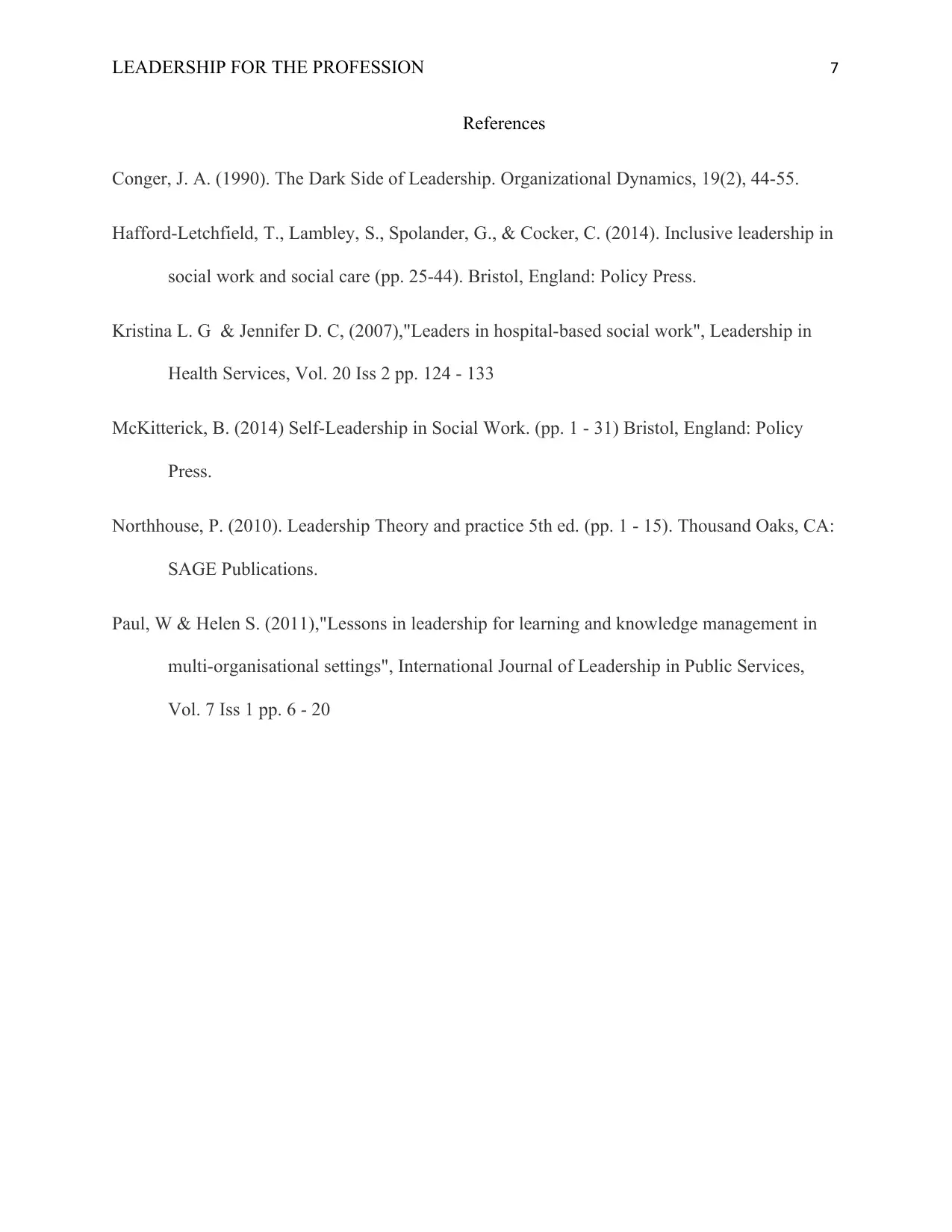
LEADERSHIP FOR THE PROFESSION 7
References
Conger, J. A. (1990). The Dark Side of Leadership. Organizational Dynamics, 19(2), 44-55.
Hafford-Letchfield, T., Lambley, S., Spolander, G., & Cocker, C. (2014). Inclusive leadership in
social work and social care (pp. 25-44). Bristol, England: Policy Press.
Kristina L. G & Jennifer D. C, (2007),"Leaders in hospital-based social work", Leadership in
Health Services, Vol. 20 Iss 2 pp. 124 - 133
McKitterick, B. (2014) Self-Leadership in Social Work. (pp. 1 - 31) Bristol, England: Policy
Press.
Northhouse, P. (2010). Leadership Theory and practice 5th ed. (pp. 1 - 15). Thousand Oaks, CA:
SAGE Publications.
Paul, W & Helen S. (2011),"Lessons in leadership for learning and knowledge management in
multi-organisational settings", International Journal of Leadership in Public Services,
Vol. 7 Iss 1 pp. 6 - 20
References
Conger, J. A. (1990). The Dark Side of Leadership. Organizational Dynamics, 19(2), 44-55.
Hafford-Letchfield, T., Lambley, S., Spolander, G., & Cocker, C. (2014). Inclusive leadership in
social work and social care (pp. 25-44). Bristol, England: Policy Press.
Kristina L. G & Jennifer D. C, (2007),"Leaders in hospital-based social work", Leadership in
Health Services, Vol. 20 Iss 2 pp. 124 - 133
McKitterick, B. (2014) Self-Leadership in Social Work. (pp. 1 - 31) Bristol, England: Policy
Press.
Northhouse, P. (2010). Leadership Theory and practice 5th ed. (pp. 1 - 15). Thousand Oaks, CA:
SAGE Publications.
Paul, W & Helen S. (2011),"Lessons in leadership for learning and knowledge management in
multi-organisational settings", International Journal of Leadership in Public Services,
Vol. 7 Iss 1 pp. 6 - 20
1 out of 7
Related Documents
Your All-in-One AI-Powered Toolkit for Academic Success.
+13062052269
info@desklib.com
Available 24*7 on WhatsApp / Email
![[object Object]](/_next/static/media/star-bottom.7253800d.svg)
Unlock your academic potential
Copyright © 2020–2025 A2Z Services. All Rights Reserved. Developed and managed by ZUCOL.





